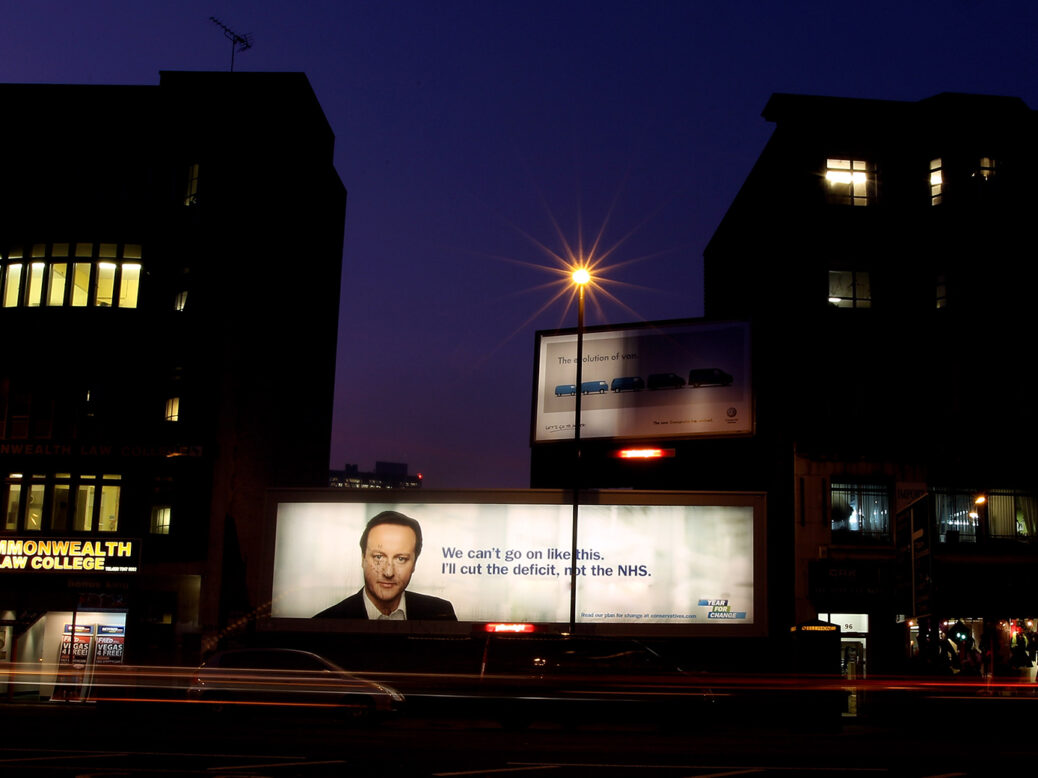
In the run-up to the 2010 election, this country was in a mess. GDP, both absolute and in per capita terms, had fallen in the wake of the financial crisis. Average wages, too, had taken a hit. Outside the realm of dry economic statistics, in what politicians like to refer to as the “real economy”, an unnerving number of crises were looming into view: an underfunded social care system, in which people could lose everything they had and still end up without good care in old age; a slight but definite decline in the rate of home ownership, as a growing number of people found themselves priced out; the near collapse in decent pension provision.
Worst of all, so far as the people running the opposition Conservatives’ campaign seemed to think, the deficit — the measure of the gap between the amount coming into the Treasury and the amount then spent — had exploded as tax revenues from the financial sector collapsed. What the Tories wanted us to think about all this was clear from their campaign slogan: “We can’t go on like this.”
You can probably see the punchline to this one coming a mile off, although to be fair we’ve had 12 years to think about it, in between bouts of hysterical crying, but: we did go on like this. And if the list of problems I just ran through sounds remarkably familiar, that’s because the Tories have failed to solve any of them. GDP has grown, but mostly because the population has, and neither GDP per capita nor real wages have risen in the consistent manner history might lead you to expect. Even before the current cost of living crisis — even before Covid — we were barely better off than we were when the Tories came to power, a break with the last two centuries of economic history so weird that economists have given it a name: the “productivity puzzle”.
Actually, that isn’t fair. It’s not that we’re barely better off. It’s that we’re much, much worse off. Social care is still under-funded but the demographic crisis is much closer, and the lack of safe and decent provision for the elderly is swallowing up more and more beds and budget in the NHS. The government has introduced automatic saving towards pensions, but the gap between the amount actuaries tell us we need to save and the amount that we’re actually capable of saving is so vast that the problem hasn’t been solved after all. The housing crisis, of course, has become a lot, lot worse, with home ownership rates down, prices and mortgage debt up and rents increasingly silly.
I doubt all this would have felt worth it even if the various Conservative governments had succeeded in getting the deficit down, but they didn’t. After gutting large chunks of the British state in the name of deficit reduction, leaving local government in penury and the public realm increasingly, visibly shabby, the public finances are not strikingly better than they were in 2010. It turns out that growing revenues matter as much as shrinking spending; that crises and budget shocks can happen to any government; that you can’t cut your way out of crisis after all.
All of which raises a question: what the hell have the Tories been doing while in power for the past 12 years? Look at any long-running government from history and you can see plenty of missteps and broken crockery, but also achievements that are pretty hard to deny. New Labour improved public services and massively reduced poverty; the Tory governments of the 1950s and ’60s tackled the post-war housing shortage. Even the Thatcher and Major governments, well, they may have gutted the economy of large chunks of the country, but they undeniably changed things, moving us to an entirely different economic model. You may not like the results but you can’t deny that it happened.
This lot, though: what the hell have they done? Michael Gove’s school reforms; tripling tuition fees, so that nearly half of 21-year-olds begin their adult lives loaded up with debt and effectively pay vastly higher marginal tax rates than those who came before them; making landlords much, much richer — hardly enough to justify a dozen years in power.
The biggest thing, loathe it though I do, must be something that those shiny PR men who dominated the party back in 2010 never actually meant to do at all: Brexit. But both the endless talk of Article 16 and the increasingly hard-to-ignore queues of lorries on the M20 must suggest that there is at least some chance that, while Britain will surely never rejoin the European Union, Brexit is not truly done after all.
As much as I’d like to blame all this on the Tory party, in good conscience I cannot, because we let them do it. The country has voted them into office. The media has been repeatedly distracted by Westminster soap opera nonsense. It’s half a decade or more since the government did anything substantive to address any of the myriad problems we face, but none of us are talking about that.
Now we’re all distracted by partygate, and while the Prime Minister clearly should resign, when his allies say there are more important things we could be talking about, it’s hard to entirely disagree. But they shouldn’t imagine that talking about those things would improve their party’s lot in life. If we did, all we’d really be talking about is all the many ways in which they’ve failed.






